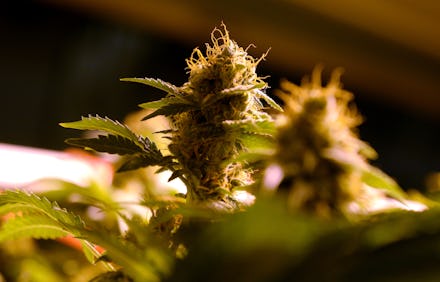Colorado Has Already Raised More Marijuana Taxes for Schools This Year Than in All of 2014

Legal weed in Colorado is beginning to pay off for the state's educational system.
Marijuana excise taxes set up to generate revenue for Colorado schools in the first five months of 2015 have exceeded the total collected in all of 2014 combined, KOAA reports.
While the school-specific taxes generated $13.3 million in 2014, they've already generated a total of $13.7 million through the end of May for school improvement and construction. In other words, the flow of money going to schools from legal weed in Colorado has doubled in pace relative to last year.
The background: As Mic's Gregory Krieg previously reported in March, excise tax revenues have continued to climb steadily since the legalization project began in January 2014, leading to more than a tenfold increase in overall revenue. After starting at a tepid $0.2 million in the first month of sales, Coloradans were contributing up to $2.35 million each month to the excise tax's school-building fund by the turn of the year.
The 15% tax is levied on bulk sales of marijuana between growers and sellers rather than charged at the register. As such, it reflects the sustained growth of Colorado's marijuana industry, despite volatility and losses as the market has expanded.
The excise tax will continue to pour money into the school construction fund until a total of $40 million has been collected, after which point the funds could be used for other projects. Based on the rapid growth of the marijuana market in Colorado, that annual cap seems to be on track for its goal by the end of Colorado's next fiscal year, ending in June 2016.
Colorado Fiscal Institute communications director Tim Hoover told Mic the revenues generated were modest in comparison to the overall state budget, but conceded revenue may be on track to meet the $40 million goal. He added that marijuana tax revenue alone would not have an extensive impact on the operational funding of any school districts.
But while the revenue that goes to schools is nowhere near enough to fix Colorado's chronically underfunded educational system, it nonetheless has gone to a wide variety of capital improvement projects, as well as grants to hire health professionals to work at schools.
It's not just school money: A Washington Post analysis concluded total revenues for the legal marijuana industry in Colorado approached $700 million last year, the vast majority of sales coming out of Denver, but with additional hotspots forming in Boulder and Colorado Springs. While 2014's total new tax revenue from recreational marijuana was $44 million, short of the originally projected $70 million, it looks like the market for 2015 is rapidly catching up.
The money isn't a game-changer, especially compared to Colorado's $5.9 billion annual budget for schools. But it is yet more evidence a legal recreational marijuana industry, properly regulated, can be economically productive — especially when the wave of crime, car crashes and teenage pot addiction critics expected simply didn't materialize.
The tens of millions of dollars Colorado is hauling in from legal weed has to be weighed against the costs of prohibition. The ACLU estimates states spent about $3.6 billion enforcing marijuana laws in 2010.